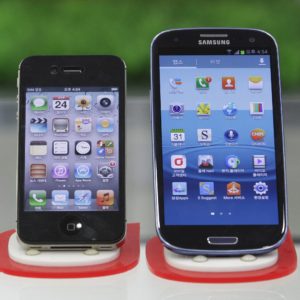As two of the world’s largest consumer electronics companies face off at the Supreme Court Tuesday, experts in legal, patent, technology and consumer advocacy fields are urging the Supreme Court to overturn a ruling in the smartphone war between Apple and Samsung that awarded the iPhone maker the total profit of patent-infringing Galaxy devices.
Supreme Court justices will hear oral arguments Tuesday before deciding whether to overturn a U.S. Federal Circuit Court of Appeals decision ordering Samsung to pay Apple the total profit of several smartphones the court ruled copy iPhone patents.
Samsung paid Apple $548.2 million last year for infringing on several patented iPhone features in its Galaxy S II, S III, Note and Note II handsets, but argues it shouldn’t have to pay another $399 million for copying obvious ergonomic features like the iPhone’s rounded corners, front face or app icon design.
The court based its ruling on a portion of the Patent Act, 19th century legislation that states a party convicted of copying a design patent can be made to turn over the “entire profit” of an infringing product. This is different from a utility patent, used to claim infringement damages based on the patent value, not the total product.
According to G. Nagesh Rao, a former senior policy advisor for the U.S. Department of Commerce’s Patent & Trademark Office, design patents were originally intended to protect ornamental appearance (a term not easily defined) during a time when products were simpler and intended for a single use, like a carpet, saddle or teapot — not a smartphone that can incorporate thousands of components and even more patents.
“The real question is how does one adequately defend itself in the age of free and more transparent information from potential IP infringement threats?” Rao told InsideSources. “That is a question our capitalistic free market society will have to ask itself. Are property rights like patents and copyrights a tool for exploitation, or do we proceed back to the original intent of the founding fathers to utilize these incentives to encourage public disclosure for the useful promotion of the arts and sciences in exchange for a limited term monopoly to recoup R&D costs and make a little profit?”
The nature of intellectual property, he added, requires attorneys and judges to constantly reinterpret the law.
“Suffice to say we gotta get back to basics and return to the heart of what this type of property right was meant to do and incentivize,” Rao said. “We are a nation of builders — we build on the shoulders of giants, we want to encourage creativity, ingenuity, and discovery — not suppress it.”
Professor Daryl Lim, director of the John Marshall Law School’s Center for Intellectual Property, Information and Privacy Law, warned upholding the decision would invite a new wave of patent trolls, who until recently have relied on utility patents to make infringement demands.
“Apple’s three infringed designs patents in this case protect a black, rectangular, a round-cornered front face, and the colorful grid of sixteen icons on the screen. To conclude that one of these designs drives purchasing decisions implies that none of the other contributions from Samsung or other innovators matter,” Lim said.
“The lower court ruling offering total profit awards for infringement trivial design elements severs the chord between contribution and reward,” he continued. “Without a reversal, patent assertion entitles, sometimes called ‘trolls,’ will have a foothold to launch total profit infringement claims on businesses.”
Tim Sparapani, Facebook’s first director of public policy, said applying the 120-year-old law to contemporary patents will impact budding entrepreneurs, who often lack the resources to mount a legal defense against trolls, who commonly make entire businesses around acquiring general patents and suing developers with similar designs.
“Our existing design patent law has been stretched too far,” Sparapani said. “The Supreme Court should reverse this ruling and set the precedent now, otherwise it’s going to be a field day for patent trolls. Small businesses and startups are going to suffer the worst because they don’t have the money or the lawyers to fight off these trolls.”
Among those hardest hit could be the agriculture industry, Leroy Watson of the agriculture non-profit National Grange previously warned. The threat of a lawsuit for the total profit of products like telecommunications-equipped farming equipment, which commonly serves only a niche market of non-wealthy consumers, will deter innovators from developing those products and stall technological innovation in an already small market.
“For years, the agricultural industry has relied on technological innovations to advance efficiencies in farming,” Watson said Monday. “Many of these advancements are developed by entrepreneurs. Should the threat of total profits damages continue to loom large, their ability to innovate could be hindered by the fear of costly design patent litigation.”
Absent a Supreme Court reversal, he added, “offensive troll-like litigation using design patent infringement total profit threats is likely to spike dramatically.”
President of the Hispanic Leadership Fund Mario Lopez thinks a win for Apple and the innovation stifling that could occur as a result will especially hurt minority and low-income consumers, who will face higher prices if competition is reduced.
“Internet access has become a necessity in everyday life for students, professionals and families,” Lopez told InsideSources. “Reducing affordable access to smartphones can affect everything from access to educational resources, mobile health care, government services and job opportunities.”
Lopez said small companies often settle patent disputes even when they haven’t infringed to avoid costly legal battles. Real change, he added, must include changes to how patents are granted.
“Without corrective action, the patent trolling problem will likely get worse,” Lopez said. “Solutions should also include a more strict adherence to the limits of patents (what they do and do not protect) and the quality. Weak, vague, or duplicative patents, like Apple’s rounded rectangle device, arm trolls and fuel abuse.”

